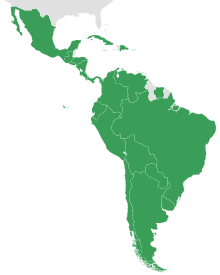Latin American Parliament
The Latin American Parliament (Parlatino) is a regional, permanent organization composed by the countries of Latin America and the Caribbean. It is a consultative assembly similar to the early European Parliament.[1] Currently the institution is being considered to become the legislative organ of the Community of Latin American and Caribbean States.[2]
Latin American Parliament Parlamento Latinoamericano (Spanish) Parlamento Latino-americano (Portuguese) Latijns-Amerikaanse parlement (Dutch) | |
|---|---|
 Parlatino flag | |
| Type | |
| Type | |
| History | |
| Founded | 10 December 1964 |
| Leadership | |
President of the Latin American Parliament | |
Alternate President of the Latin American Parliament | |
General-Secretary of the Latin American Parliament | |
Alternate General-Secretary of the Latin American Parliament | |
Committees Secretary of the Latin American Parliament | |
Inter-Parliamentary Relations Secretary of the Latin American Parliament | |
Inter-Institutional Relations Secretary of the Latin American Parliament | |
Delegate President of the Latin American Parliament | |
Vice Presidents of the Latin American Parliament | 23 |
| Structure | |
| Seats | 276 |
| Committees |
13 |
| Meeting place | |
| Latin American Parliament building, Amador, Panama City, | |
| Website | |
| parlatino.org | |
Origins, mandate, principles and purpose
The Latin American Parliament (Parlatino) was created in 1964. Its current mandate is derived from the Treaty of Institutionalization which was ratified on 16 November 1987. Situated in Panama City, Panama,[3] the Parlatino has 23 member parliaments, each of which sends to it 12 nominated plenipotentiaries. The plenipotentiaries must represent the views of their parent parliament, and take into consideration the principles of the Parliament which include the defence of democracy and the further intergeneration of Latin America. The purposes of the Parlatino are:[1]
- To promote, human rights, and economic and social development;
- To maintain and foster relations with other geographic parliaments (such as the European Parliament, as well as international organisations);
- To promote self-determination and defence against imperialism and colonialism.
Institutions
.jpg)
The main institutions of the Parlatino are:[1]
- The unicameral Plenary Assembly which meets annually;
- The Board of Directors of the Plenary Assembly which is chaired by the President of the Assembly and oversees the work of the Parlatino between the Assembly's sessions.
- In 2009 there were thirteen permanent committees:[1]
- Cattle-raising and fisheries;
- Citizen safety, combat and prevention of narcotraffic, terrorism and organized crime;
- Economic affairs, social debt and regional development;
- Education, culture, science, technology and communication;
- Energy and mines;
- Environment and tourism;
- Gender equity, childhood and youth;
- Health;
- Human rights, justice and prison policies;
- Indigenous peoples and ethnic groups;
- Labour, social security and legal affairs;
- Political, municipal and integration affairs;
- Utilities and defence of users and consumers.
Members

As of 2013, the following countries and territories are members of the Latin American Parliament:[4]
See also
- Latin American Integration Association (LAIA)
- Union of South American Nations
- Latin American and Caribbean Congress in Solidarity with Puerto Rico’s Independence
- Latin America Memorial
- South American Parliament (proposed)
- Central American Parliament
- Andean Parliament
- Mercosur Parliament
Notes
- Evans & Silk 2009, p. 350.
- acn 2011, Havana Hosts Meeting ....
- Parlatino, Cómo llegar al Parlamento Latinoamericano, Parlatino, archived from the original on 20 April 2013 External link in
|publisher=(help) - Informaciones de los Países Miembros Archived 20 October 2013 at the Wayback Machine Parlatino.org (in Spanish)
References
- acn (26 May 2011), Havana Hosts Meeting of Latin American Parliament, Radio Cadena Agramonte External link in
|publisher=(help) - Evans, Paul; Silk, Paul, eds. (2009), The Parliamentary Assembly: practice and procedure, Council of Europe, p. 350, ISBN 978-92-871-6485-8
- Pearson, Tamara (26 September 2010), National Assembly Election Results - 95 Legislators for PSUV, Venezuelanalysis.com
External links
- Latin American Parliament, archived from the original on 23 July 2010, retrieved 6 December 2005 official site in Portuguese and Spanish